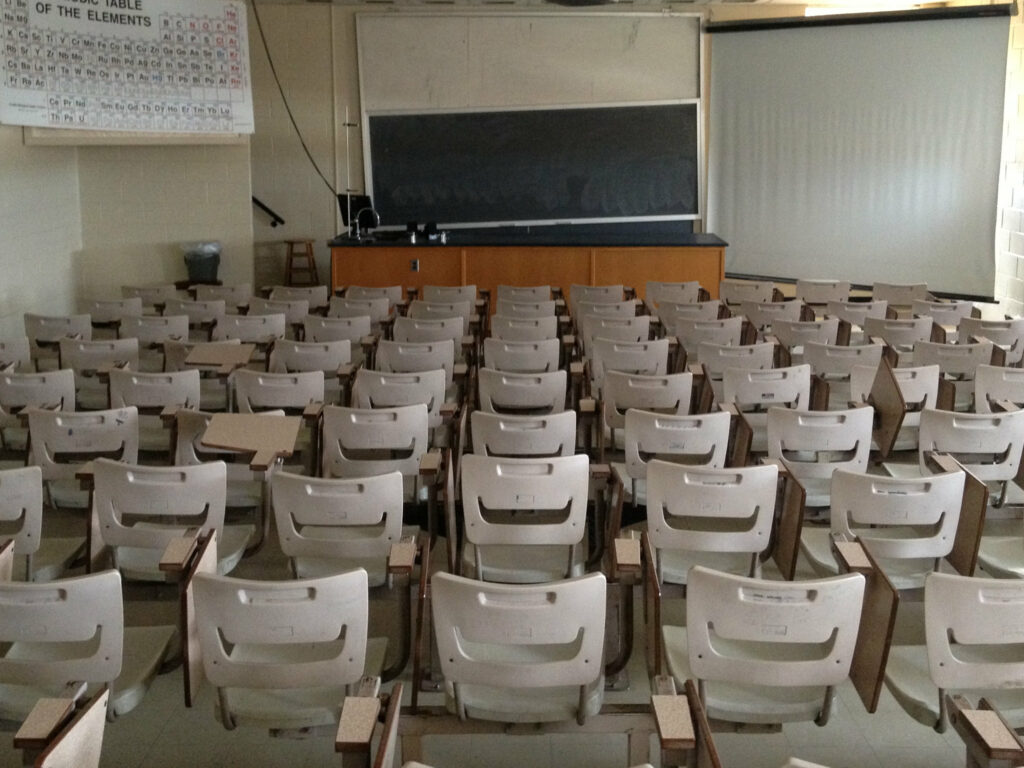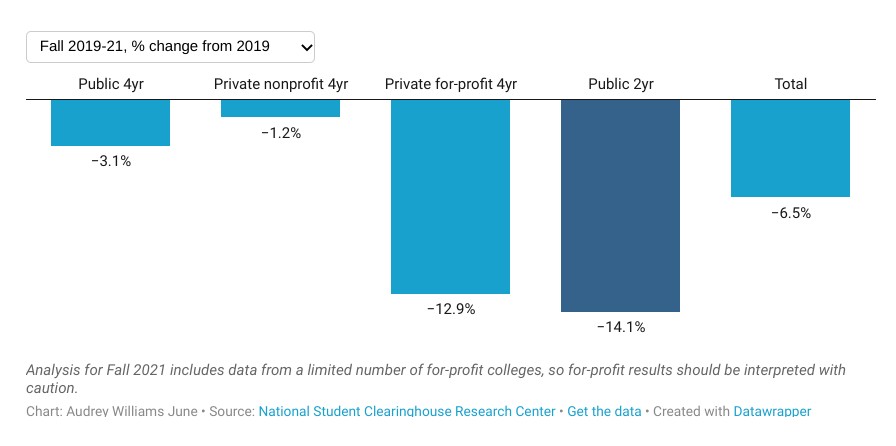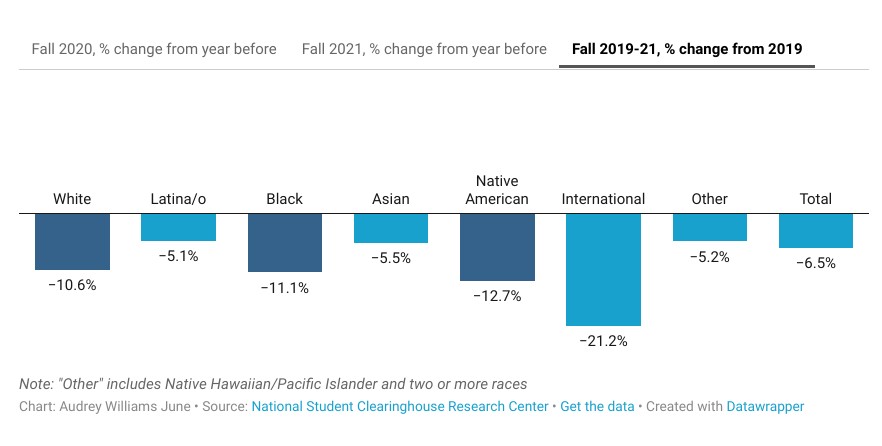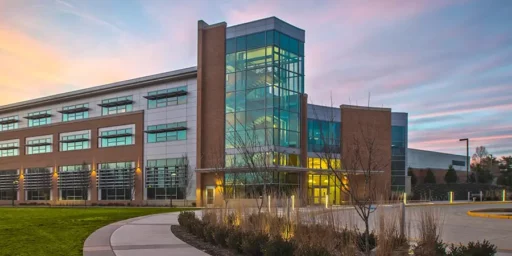College Enrollments Down
Another effect of the pandemic.

Due to the Covid-19 pandemic, we have had ~760,000 deaths, and almost 47 million sick in the United States alone (as of the writing of this post). These numbers go to 5 million and 224 million, respectively, if we expand to a global scale. This death and sickness has clearly affected any number of people in a host of ways. I suspect, too, it has caused some significant number to simply reevaluate their lives and we are currently seeing the consequences and in ways we do not understand. An example would be the current employment picture.
Another appears to be college enrollments.
Via NPR: College enrollment plummeted during the pandemic. This fall, it’s even worse
Enrollment at U.S. colleges and universities is on track to fall by another nearly 500,000 undergraduate students this fall, continuing the historic drops that began with the start of the coronavirus pandemic, according to new data out Tuesday.
The decline of 3.2% in undergraduate enrollment this fall follows a similar drop of 3.4% the previous year, the first fall of the pandemic, according to the research from the National Student Clearinghouse Research Center.
[…]
If these preliminary numbers hold up, Shapiro says the last two years of undergrad decline, totaling more than 6%, would be the largest two-year decrease in at least half a century.
This comports with what I have observed in my day job–we are seeing enrollment behavior that does not fully comport with past patterns. Whether this is the result of some general uncertainty about the world at the moment that will eventually snap back into place, or if it is some permanent re-evaluation of choices is impossible to say (again, I think this is linked to behavior we are seeing in the employment market).
For example,
In previous recessions, college enrollments have followed a wavelike pattern: When the economy is doing poorly, enrollment, especially at community colleges, typically goes up. Students go to college when they can’t find work. But as the job market improves, they leave college and join the workforce.
“This time, that entire crest of that wave just didn’t happen — it got swallowed up by the pandemic,” explains Shapiro. “What we’ve seen instead is literally two troughs, one after the other. So there was no upside from the recession. We just got the downside from the recovery, as the labor market recovers and jobs are going back up.”
Of course, part of that might be because the pandemic-related recession was different that, for lack of a better way of putting it, more “natural” recessions.
The hit is biggest for community colleges:
The preliminary fall data show the decline this fall to be 5.6%. That’s not quite as steep as last year: In the fall of 2020, community college enrollment fell by roughly 10% nationally — a loss of over 544,200 students when compared with the fall of 2019.
Regardless, this is not just about higher ed,
Overall, enrollment in undergraduate and graduate programs has been trending downward since around 2012, but the pandemic turbocharged the declines at the undergrad level. When fewer students go to college, fewer students graduate, get job training and move on to higher-paying jobs, meaning all this could have huge ramifications for the U.S. economy.
Here are the numbers comparing 2019 to 2021 (via the Chronicle of Higher Education):

And here is the breakdown by type of student:







I wonder how much of it is the perceived lower value of online classes compared to in-person?
@Michael Cain: That would explain last year more than this year. Although uncertainty as to what mode of teaching who prevails is likely part of it.
We were face-to-face all of last year, with social distancing, and have had limited restrictions this year (masks) but have seen the decline.
We have a large online presence and those are down, too compared to two years ago.
It would be nice to have a break down by major/program. Is STEAL declining faster than STEM?
But one element that is skipped over is that the decline is below the ‘elite’ status universities. It is in the lower poor facsimile of the Ivy tiers, that no matter how hard they try can’t provide the signaling of the status uni.
There’s also the fact that most of what college provides graduates was declared non-essential last year. And that makes a person think about their future, especially when 99.9% of students below the status U level are going to learn how to earn a better living rather than the ‘intrinsic’ value trotted out by the hobby credentialed liberal arts professors. All this intrinsic stuff you can learn for free or for a modest subscription, often from better thinkers than the average non-status U professor.
Right now, there is good money to be made if you are technically minded and willing to work in a trade. They’ll teach you as they pay you. And college can always come later, when you know the hands-on to get the theory. And those who went that way will tell you engineering is a lot easer if you’ve put your hands on the gear even it just to tweak it.
After all, if your college credential got you the job, you are replaceable if you offend the regime, but few will continue to turn away the man, or woman, who can do something useful, like get your AC or heat working over a political opinion tweet.
I got a BA in 1969. For my cohort, education was clearly a great value. For one thing, education was much less costly; two semesters of in-state tuition at land grant Big Ten schools could be earned at a minimum wage summer job. Education costs have increased a lot. However, it still seems like a good deal to me both for pay and employment security. https://www.bls.gov/emp/tables/unemployment-earnings-education.htm
I have no idea what the work situation will be in 2040 and beyond, and today’s young people must assess what will happen then. We tend to think that there is some formula for success in life, but certainty is elusive. Ten years after my BA, I and my friends were underemployed and scraping by. Fifty years later, we are retired with financial security and romanticize the days of driving rusty VW minibuses and drinking generic beer.
My community college is roughly following the overall trend, but different programs and departments are feeling it in different ways. Some are up and some are down.
@Slugger:
Econ professor Ed Leamer has a great summary of what has changed since your time in college and the fact most colleges have not adapted to teaching what is needed, i.e., problem solving. He did miss that the trades depend and teach the problem solving.
–Econtalk podcast with economist Ed Leamer, April 13, 2020
@JKB: Just this weekend I ruled out two local electricians for my big project because of their “Brandon” Facebook posts that they were too stupid to just keep silent about (or make private).
I won’t support that crap – even in the trades.
Guess that ruins your theory
Late to the party but I’ll add some random thoughts to the discussion. This is yet another trend that was already underway (or at least the seeds had been planted) prior to the pandemic that the pandemic has exacerbated or accelerated.
1. We were hearing about the shortage of qualified workers in the trades well before the pandemic. If you consider the average starting salary of people with a four year degree is only ~$55K, forgoing college (especially community college and lower-tier public schools) in favor of an apprenticeship or a vocational school makes a lot of sense.
2. Add to that the ridiculous cost of college tuition. My own alma mater, a larger mid-tier state school, has had tuition increases that have exceeded the rate of inflation by 450% since I graduated in the mid-1990s. Compared to many, this increase is actually pretty modest. Any gateway to a working life that requires forgoing income (for the most part) for four years while accruing massive amounts of debt sure seems like a questionable choice.
3. Many of the “good” jobs obtainable with a college degree also require the employee to live in areas with highly unfavorable real estate prices. So even if you start at $72K/yr in your chosen field, if you either have to live someplace where you will never be able to afford a home or have a soul-crushing urban commute, that money suddenly doesn’t look so lucrative.
4. The dramatic rise in hourly pay we are now just starting to see in many jobs previously known for paying poorly will also have an impact. If I can make almost $40K/year with benefits working at Costco, and maybe work my way up to manager someday, going to college for two or four years just to make not much more seems much less palatable.
In Ohio, many of the large public universities have seen enrollment increase – in our specific college’s case within a university, skyrocket. Smaller universities/colleges near us have seen a decline. Community colleges, oddly enough – slight decline.
Contra the gadfly’s opinion, one of the trends we see in our STEM college in the iGeneration is lack of ability to think critically. I’ve seen some research that ties this to the ready availability of information – students don’t know how to sort through what they can find, and they don’t know how to critically assess the validity of the information or to discern a reliable source. This is a crucial skill even, or especially, in STEM fields. Instead of just worrying about remedial calculus, though, we’re now having to figure out how to teach remedial critical thinking.
As a fan of the liberal arts and history, particularly the latter for teaching critical thinking, I also note we’ve seen a decline in English test scores – SAT/ACT/AP. A lot of students who enter our programs have AP English credit and yet can’t write a five-paragraph essay. A lot come in with the belief that because they’re majoring in a STEM field they don’t have to be conversant with grammar, spelling, or formatting. Which lasts until their first internship… when they find out that the company they’re working for expects them to be able to write complete sentences!
We saw this trend pre-pandemic, but the pandemic has exacerbated it. Online teaching =/= online learning, particularly for those who were HS juniors and seniors during COVID. Our college is working hard (we have a vaccine mandate and classes have been largely in person with some hybrid adaptations) to help these particular COVID classes , since these students have missed out on a minimum of 1 year of learning and closer to 2 and it shows in our college first- and second-year students.